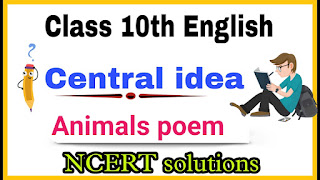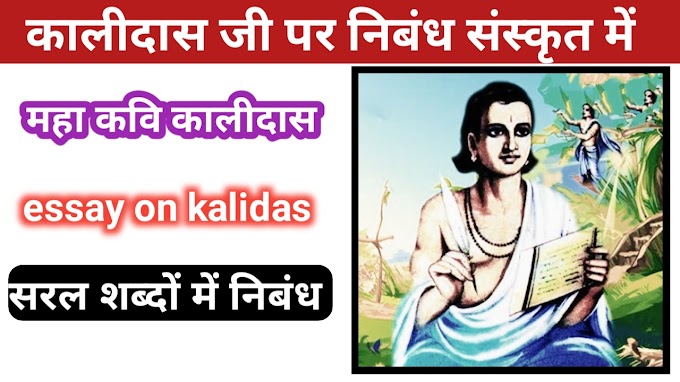Animals poem Central Idia // एनीमल पोइम सेन्ट्रल आइडिया
Central Idia of Animals
नमस्कार दोस्तों स्वागत है आपका हमारी वेब साइट subhansh classes.com पर यदि आप गूगल पर Animals poem central idia सर्च कर रहे हैं तो आप बिलकुल सही जगह पर आ गए हैं हम आपको इस poem का सेंट्रल idia हिंदी और अंग्रेजी दोनों में बताएंगे, इसलिए आप पोस्ट को पूरा जरूर पढ़ें यदि आपको पोस्ट पसन्द आए तो अपने दोस्तो को भी शेयर करें यदि आप कुछ पूछना चाहते हैं तो आप हमारे youtube chennal Subhansh classes पर कॉमेंट करके ज़रूर पूछ लीजिएगा
(05) Animals (Walt Whitman)
{ CENTRAL IDEA OF THE POEM }
परीक्षा में Poetry भाग की किन्हीं भी दो Poems के नाम दिए जाते हैं, जिनमें से किसी एक Poem का Central Idea लिखना होता है। इसके लिए 4 अंक निर्धारित हैं।
Animals central idia
In this poem, Walt Whitman has beautifully brought out the contrast between animals and human beings. According to the poet, animals are better than human beings and have all the qualities that humans lack or have forgotten. The poem 'Animals' shows the poet's love for animals and his desire to live as an animal because he thinks that they are serene and self-contented. The theme of the poem is not to say how good
animals are but to compare humans with them in order to highlight the flaws of human nature. The poet believes that probably a very long time ago, humans possessed all these qualities but they have lost them now.
इस कविता में, वॉल्ट व्हिटमैन ने बुहत सुन्दरता से जानवरों एवं मनुष्यों के मध्य का अन्तर प्रकट किया है। कवि के अनुसार, जानवर मनुष्यों से श्रेष्ट्य हैं और उनमें वे सारे गुण हैं जिनकी मनुष्यों में कमी है अथवा जिन्हें मनुष्य भुला चुके हैं। कविता 'Animal' पशुओं के प्रति कवि का प्रेम एवं उन्हीं की भाँति रहने की कवि की इच्छा दर्शाती है क्योंकि उनका यह विचार है कि जानवर शान्त एवं आत्म-सन्तोषी होते हैं। कविता का विषय यह बताना नहीं है कि जानवर कितने बेहतर हैं परन्तु मानव स्वभाव की कमियाँ उजागर करने हेतु जानवरों की मनुष्यों से तुलना करना है। कवि का यह विश्वास है कि बहुत लम्बे समय पहले, मनुष्यों में भी ये सभी गुण थे किन्तु वे अब इन्हें खो चुके हैं।
Q1. Notice the use of the word 'turn' in the first line, "I think I could turn and live with animals...". What is the poet turning from?
'टर्न' शब्द का पहली पंक्ति में उपयोग देखिए, "मैं सोचता हूँ कि मैं नई दिशा ले सकता हूँ और जानवरों के साथ रह सकता हूँ" कवि कहाँ से मुड़ रहा है?
Ans. In this line, the poet wants to turn from a human into an animal. This turning represents the poet's desire to get away from the depressing, selfish and false world of humans and stay with animals.
Q2. Mention three things that humans do and animals don't. ऐसी तीन चीजों का उल्लेख कीजिए जो मनुष्य करते है एवं जानवर नहीं।
Ans. Three things that humans do and animals don't are as follows Humans complain and cry about the miseries they face but animals do not do that.
Humans lie awake at night thinking about their wrong doings but animals do not do that.
Humans talk about their religiousness and duty towards God but animals do not do that.
Q3. Do humans kneel to other humans who lived thousands of years ago? Discuss this in groups. क्या मनुष्य अन्य मनुष्यों जो हज़ारों वर्ष पहले जीवित थे, के सामने झुकते है? समूह में चर्चा कीजिए।
Ans. Yes, humans kneel to other humans who lived thousands of years ago as it is a cultural tradition to respect elder persons.
These persons could be their ancestors, saints or preachers whom they follow religiously. (Students can discuss their own culture with their classmates and share the rituals and traditions of their culture and also get to know about other cultural practices).
Q4. What are the 'tokens' that the poet says he may have dropped long ago and which the animals have kept for him? Discuss this in class. (Hint: Whitman belongs to the Romantic tradition that includes Rousseau and Wordsworth, which holds that civilisation has made humans false to their own true nature. What could be the basic aspects of our nature as living beings that humans choose to ignore or deny?)
वे 'टोकन' क्या हैं जिन्हें कवि कहता है कि उसने सम्भवतः काफी लम्बे समय पहले गिरा दिया था एवं जो जानवरों ने उसके लिए रखे हैं? कक्षा में चर्चा कीजिए।
(संकेत व्हिटमैन साहित्य की रोमांटिक परम्परा से थे जिसमें रूसों एवं वर्डस्वर्थ भी सम्मिलित हैं जो यह मानते हैं कि सभ्यता ने मनुष्य को स्वयं के स्वभाव के प्रति झूठा बना दिया है। जीवित प्राणियों के रूप में हमारे स्वभाव के कौन-से मूल पहलू हैं जिन्हें मनुष्य नकारते अथवा नज़रअन्दाज़ करते हैं?)
Ans. The tokens mentioned in the poem refer to the virtues and values possessed by animals. These virtues represent the true nature of human beings which humans have lost now. These are tokens of values such as kindness, innocence, self-containment, satisfaction, sharing, etc. The poet, Walt Whitman belongs to the Romantic tradition of literature. He along with various other poets/authors believed that the virtues mentioned above represent the true nature of man and how man should be..
However, with civilisation and development man has denied or ignored them. Humans now have become full of false values such as selfishness, greed, possessiveness, etc. They have forgotten their true characteristics that animals have still retained.
{EXTRACT BASED QUESTIONS }
परीक्षा में पाठ्य पुस्तक से किसी भी Poem का एक अंश (Stanza) दिया जाता है तथा उस पर आधारित 2 प्रश्नों के उत्तर देने होते हैं। यहाँ पर Stanza के साथ 2 से अधिक Questions दिए गए हैं, जो केवल विद्यार्थियों के सम्पूर्ण अभ्यास के लिए हैं। परीक्षा में 2-2 अंकों के 2 ही प्रश्न पूछे जाएँगे।
Read the stanzas given below and answer the questions that
follows.
1.I think I could turn and live with
animals, they are so placid and self-contain'd, I stand and look at them long and long.
Questions
(i) What does the poet want to turn into ?
(ii) What are the two qualities of animals?
(iii) What does the poet do?
(iv) Who does the poet want to live with ?
(v) Explain the successive use of the word 'long' and bring out its significance.
Answers
(i) The poet wants to turn into an animal. (ii) The animals are plncid and self-contained.
(iii) The poet stands and looks at animals for very long.
(iv) The poet wants to live with animals.
(v) The successive use of the word 'long' makes the line significant; the first 'long' denotes 'period/time' whereas the other 'desire'.
2.They do not sweat and whine about their condition, They do not lie awake in the dark and weep for heir sine, They do not make me sick discussing their duty to
God.
Questions
(i) What do humans weep for?
(ii) Why do humans lie awake in the dark?
(iii) What do humans whine about?
(iv) Who feels sick discussing about duties towards God?
(v) What does the phrase make me sick mean?
Answers
(i) Humans weep for their sins.
(ii) Humans lie awake in the dark weeping for their sins.
(iii) Humans whine about their conditions.
(iv) The poet feels sick about discussing duties towards God.
(v) The phrase means to make someone feel angry or upset.
3.Not one is dissatisfied, not one is demented with the mania of owning things, Not one kneels to another, nor to his kind that lived thousands of years ago,
Not one is respectable or unhappy over the whole earth.
Questions
(i) Who is demented with the mania of owning things?
(ii) Why are the animals not dissatisfied?
(iii) Why do animals not kneel to one another?
(iv) Why do humans kneel to those who lived a thousand years ago?
(v) What does 'kneel' symbolise here?
Answers
(i) Humans are demented the mania of owning things.
(ii) Animals are not dissatisfied because they do not have the greed to own things..
(iii) The animals do not kneel to one another because for them
(iv) Humans kneel to their ancestors to show respect towards them everyone is equal.
(v) 'Kneel' is symbolic to praying in above line.
4.So they show their relations to me and
I accept them,They bring me tokens of myself, they evince them plainly in their possession I wonder where they get those tokens,Did I pass that way huge times ago and negligently drop them?
Questions
(i) Who bring tokens to the poet?
(ii) What are these 'tokens of myself"?
(iii) What does the poet wonder?
(iv) 'So, they show their relations to me'. In the given line to whom does 'they' refer to?
(v) Why does the poet say that he negligently dropped them?
Answers
(i) The animals bring tokens to the poet.
(ii) The tokens of myself are the true values and virtues of human nature such as kindness and innocence.
(iii) The poet wonders about how the animals got those tokens.
(iv) Here, 'they' refers to animals.
(v) The poet believes that animals got their values from humans while they lost them a long time ago and have forgotten about them.
Also read
👉A tiger in the zoo central idea
👉class 10 English chapter 3 notes
👉class 10 English chapter 4 glimpses of india
👉class 10 English chapter 6 the Sermon at Benares







